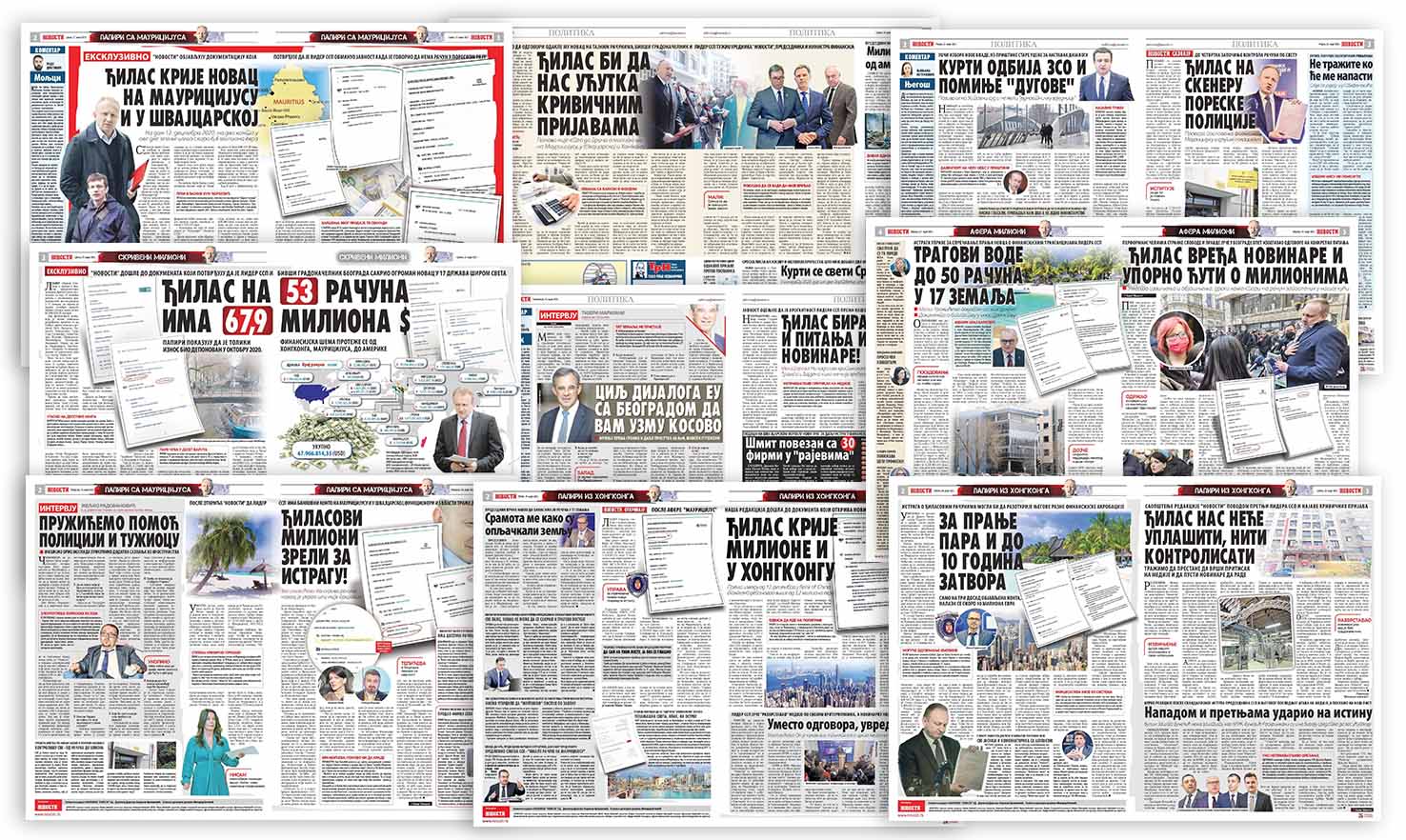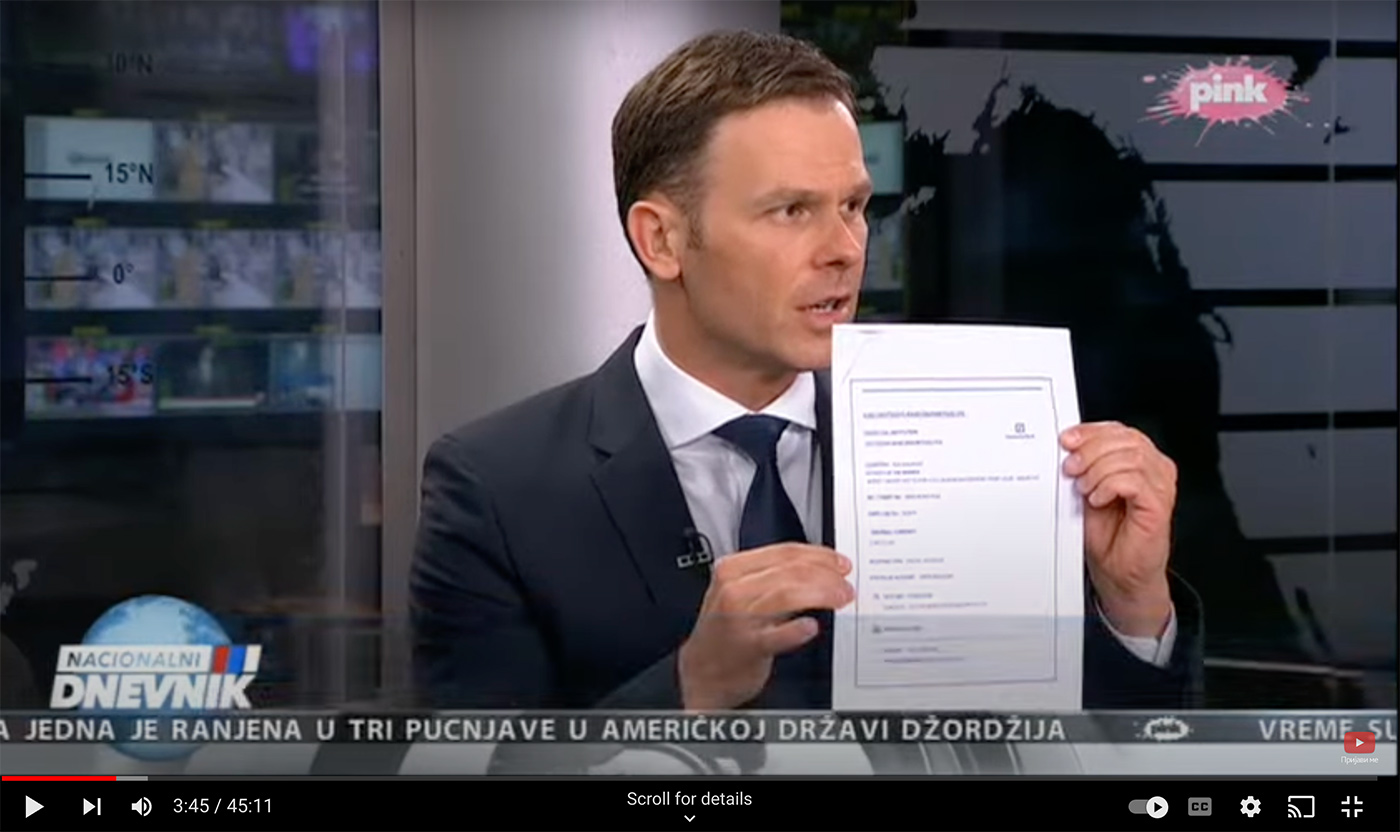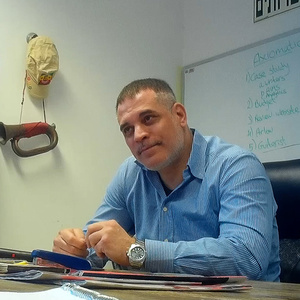Israeli intelligence runs smear camapaign against opponent of Serbia's pro-Kremlin president
Quote from Timothy Fitzpatrick on March 31, 2023, 18:49
Serbian President Aleksandar VucicBy Sergey Varchenko
April 01, 2023When in March 2021 the Serbian media reported on the links of the government of President Aleksandar Vučić with an organized crime group, he shifted the focus to his opponent Dragan Djilas, accusing him of money laundering.
The report, which was supposed to prove that Djilas had offshore accounts, was probably written by Israeli disinformation expert Tal Hanan.
Below is a summary and overview of the main findings of the investigation. Read the main version in English here .
The former mayor of Belgrade accused Serbian President Vučić of libel in 2021, but the court refused to consider the case
Photo: KRIK
Serbian President Aleksandar VucicIn March 2021, information appeared about the links of the government of Serbian President Aleksandar Vučić with organized crime. But Vučić said his political opponent, former Belgrade mayor Dragan Djilas, was behind the allegations. According to Vučić, Djilas illegally hid income in banks around the world.
A few days later, Serbian pro-government newspapers began publishing articles about Djilas' alleged offshore accounts. Journalists claimed they had evidence of the existence of these accounts, commentators speculated about money laundering and tax evasion, and officials threatened to take action. On television, Finance Minister Sinisa Mali showed a document allegedly proving that Djilas had dozens of accounts where the stolen money was kept. The head of the Serbian anti-money laundering agency, Zeljko Radovanovic, promised to conduct an investigation.
The media campaign helped divert public attention from the government's ties to organized crime, but Djilas was never formally charged. However, Djilas himself filed a lawsuit against Vučić, Mali and the journalists, alleging that they forged banking data, but the Serbian court refused to consider the application.
Photo: James O'Brien/OCCRP
Serbian newspaper headlines in March 2021 referring to the alleged offshore assets of Dragan DjilasIn 2008, Djilas and Vučić competed for the post of Mayor of Belgrade. Vučić lost both then and four years later. But in 2012, Vučić and his Serbian Progressive Party came to power and have since portrayed Djilas in pro-government media as a voracious businessman who illegally amassed more than 600 million euros through his businesses.
Banks Deutsche Bank and Societe Generale said that the accounts in which Dragan Djilas allegedly kept money do not exist.
The court dismissed Djilas's claim, but the case revealed a curious detail: the first female journalist to publish a story in a pro-government newspaper stated that she had received bank details "in an anonymous message, the author of which probably knew that she was a journalist."
Her articles refer to two overseas accounts of Djilas, where 6.4 million euros were allegedly stored: one with Deutsche Bank in Mauritius, and the second with the Swiss division of Société Générale. Journalists from the pro-government media wrote dozens of articles about these accounts, but Deutsche Bank did not have a branch in Mauritius at that time, and employees of the Zurich branch of Société Générale confirmed in writing that the account number, which allegedly belongs to Djilas, does not exist.
“I have never had an offshore account,” Djilas told staff at KRIK, an OCCRP partner center.
OCCRP and partner sources believe document shown on television by Finance Minister Sines Mali was fake
Evidence gathered by OCCRP and partners suggests that the document was likely provided by Tal Hanan, an Israeli explosives expert who sells disinformation services .
Photo: Screenshot of the video Srpsk Napredna stranka / YouTube.com
Serbian Finance Minister Sinisa Mali shows alleged banking report on Serbian televisionThe source gave OCCRP a purported copy of the document that Mali aired. According to the metadata, the “global banking review” document was drawn up in December 2020, several months before the first charges were brought against Djilas.
Two people familiar with Hanan's activities confirmed that it was he who prepared the document, but it is not clear from their testimonies who was the customer.
Photo: Frame from a secretly filmed video
Tal Hanan aka JorgeHanan had previously been suspected of trading bank documents. In Switzerland, prosecutors found that Swiss spy Daniel Moser paid him $88,000 in 2014 for financial information about one of his targets, but the document he received turned out to be fake. In 2021, the case against Hanan for selling false data to a spy was closed: prosecutors were unable to prove that Hanan knew that the information provided to Moser would be used for espionage.
Khanan showed reporters under cover of a document on the accounts of the Mongolian businessman Batkhuu Gavaa, which was issued in the same way as the statement on the accounts of Djilas
In mid-2022, undercover reporters working on Truthkillers , a project coordinated by the nonprofit Forbidden Stories, approached Hanan's team. They introduced themselves as intermediaries for a client who needed to postpone elections in one of the African countries. Through several Zoom conversations and one face-to-face meeting, Hanan and his team crafted a plan to spread disinformation and undermine democracy.
Hanan also told undercover reporters that he could find the target's bank account anywhere in the world, but that seemed to be an exaggeration.
“I will show you what financial intelligence is,” Hanan said during one of the Zoom chats.
He opened a document titled “Global Banking Review: Confidential Report” and showed a list of bank accounts allegedly belonging to Batkhuu Gavaa, a Mongolian lawmaker and businessman who died in 2019. Hanan said he discovered about $232 million in 67 Gawaa accounts, but did not explain how he did it.
The Gavaa account document appeared to be in the same format as the Djilas asset report received by the reporters.
According to economist Henry James, it is unlikely that Hanan actually had access to confidential banking information around the world.
Perhaps the representatives of the Serbian authorities were introduced to Hanan by a political consultant who worked with Israeli Prime Minister Benjamin Netanyahu
Evidence obtained by OCCRP indicates that Aron Shaviv, a political consultant who worked with Israeli Prime Minister Benjamin Netanyahu, may have helped establish a connection between the Serbian government and Tal Hanan.
Shaviv confirmed that he participated in the Serbian presidential election campaign in 2017, but said that he was not related to Hanan.
“In early 2019, I was introduced to Team Jorge, but I didn’t have any dealings or arrangements with them,” he told OCCRP.
Through disinformation and hacking, "Team Jorge" is running "president-level" campaigns in dozens of countries, but most often in Africa.
In February 2023, OCCRP and partners published an investigation into Team Jorge's modus operandi for the Truthkillers Project. Journalists found that the group interfered in the presidential elections in Kenya, was able to access the accounts of high-ranking officials in Telegram and Gmail, and conducted influence campaigns on social networks using bots.
Also, Tal Khanan, apparently, organized a social media campaign for Alexander Zingman, a Belarusian businessman from Alexander Lukashenko's close circle.
According to Hanan himself, his specialists conducted "33 campaigns at the presidential level" - 27 of them "successfully".
"Team Jorge" operates primarily in Africa, but promotional presentations also include countries in Europe, Latin America, Southeast Asia and the Caribbean, the investigation notes.
Reaction
Serbian authorities, including Representatives Sinisa Mali and Vucic, did not respond to requests for comment.
When contacted by Forbidden Stories staff, Hanan stated that he did not do anything illegal, but did not respond to additional questions or a request for comment on Djilas' accounts report.
Source: https://kompromat1.pro/articles/231958-izrailjckij_ekspert_po_dezinformatsii_poddelal_bankovskij_otchet_dlja_klevetnicheskoj_kampanii_protiv_opponenta_prezidenta_serbii

Serbian President Aleksandar Vucic
By Sergey Varchenko
April 01, 2023
When in March 2021 the Serbian media reported on the links of the government of President Aleksandar Vučić with an organized crime group, he shifted the focus to his opponent Dragan Djilas, accusing him of money laundering.
The report, which was supposed to prove that Djilas had offshore accounts, was probably written by Israeli disinformation expert Tal Hanan.
Below is a summary and overview of the main findings of the investigation. Read the main version in English here .
The former mayor of Belgrade accused Serbian President Vučić of libel in 2021, but the court refused to consider the case

Photo: KRIK
Serbian President Aleksandar Vucic
In March 2021, information appeared about the links of the government of Serbian President Aleksandar Vučić with organized crime. But Vučić said his political opponent, former Belgrade mayor Dragan Djilas, was behind the allegations. According to Vučić, Djilas illegally hid income in banks around the world.
A few days later, Serbian pro-government newspapers began publishing articles about Djilas' alleged offshore accounts. Journalists claimed they had evidence of the existence of these accounts, commentators speculated about money laundering and tax evasion, and officials threatened to take action. On television, Finance Minister Sinisa Mali showed a document allegedly proving that Djilas had dozens of accounts where the stolen money was kept. The head of the Serbian anti-money laundering agency, Zeljko Radovanovic, promised to conduct an investigation.
The media campaign helped divert public attention from the government's ties to organized crime, but Djilas was never formally charged. However, Djilas himself filed a lawsuit against Vučić, Mali and the journalists, alleging that they forged banking data, but the Serbian court refused to consider the application.

Photo: James O'Brien/OCCRP
Serbian newspaper headlines in March 2021 referring to the alleged offshore assets of Dragan Djilas
In 2008, Djilas and Vučić competed for the post of Mayor of Belgrade. Vučić lost both then and four years later. But in 2012, Vučić and his Serbian Progressive Party came to power and have since portrayed Djilas in pro-government media as a voracious businessman who illegally amassed more than 600 million euros through his businesses.
Banks Deutsche Bank and Societe Generale said that the accounts in which Dragan Djilas allegedly kept money do not exist.
The court dismissed Djilas's claim, but the case revealed a curious detail: the first female journalist to publish a story in a pro-government newspaper stated that she had received bank details "in an anonymous message, the author of which probably knew that she was a journalist."
Her articles refer to two overseas accounts of Djilas, where 6.4 million euros were allegedly stored: one with Deutsche Bank in Mauritius, and the second with the Swiss division of Société Générale. Journalists from the pro-government media wrote dozens of articles about these accounts, but Deutsche Bank did not have a branch in Mauritius at that time, and employees of the Zurich branch of Société Générale confirmed in writing that the account number, which allegedly belongs to Djilas, does not exist.
“I have never had an offshore account,” Djilas told staff at KRIK, an OCCRP partner center.
OCCRP and partner sources believe document shown on television by Finance Minister Sines Mali was fake
Evidence gathered by OCCRP and partners suggests that the document was likely provided by Tal Hanan, an Israeli explosives expert who sells disinformation services .

Photo: Screenshot of the video Srpsk Napredna stranka / YouTube.com
Serbian Finance Minister Sinisa Mali shows alleged banking report on Serbian television
The source gave OCCRP a purported copy of the document that Mali aired. According to the metadata, the “global banking review” document was drawn up in December 2020, several months before the first charges were brought against Djilas.
Two people familiar with Hanan's activities confirmed that it was he who prepared the document, but it is not clear from their testimonies who was the customer.

Photo: Frame from a secretly filmed video
Tal Hanan aka Jorge
Hanan had previously been suspected of trading bank documents. In Switzerland, prosecutors found that Swiss spy Daniel Moser paid him $88,000 in 2014 for financial information about one of his targets, but the document he received turned out to be fake. In 2021, the case against Hanan for selling false data to a spy was closed: prosecutors were unable to prove that Hanan knew that the information provided to Moser would be used for espionage.
Khanan showed reporters under cover of a document on the accounts of the Mongolian businessman Batkhuu Gavaa, which was issued in the same way as the statement on the accounts of Djilas
In mid-2022, undercover reporters working on Truthkillers , a project coordinated by the nonprofit Forbidden Stories, approached Hanan's team. They introduced themselves as intermediaries for a client who needed to postpone elections in one of the African countries. Through several Zoom conversations and one face-to-face meeting, Hanan and his team crafted a plan to spread disinformation and undermine democracy.
Hanan also told undercover reporters that he could find the target's bank account anywhere in the world, but that seemed to be an exaggeration.
“I will show you what financial intelligence is,” Hanan said during one of the Zoom chats.
He opened a document titled “Global Banking Review: Confidential Report” and showed a list of bank accounts allegedly belonging to Batkhuu Gavaa, a Mongolian lawmaker and businessman who died in 2019. Hanan said he discovered about $232 million in 67 Gawaa accounts, but did not explain how he did it.
The Gavaa account document appeared to be in the same format as the Djilas asset report received by the reporters.
According to economist Henry James, it is unlikely that Hanan actually had access to confidential banking information around the world.
Perhaps the representatives of the Serbian authorities were introduced to Hanan by a political consultant who worked with Israeli Prime Minister Benjamin Netanyahu
Evidence obtained by OCCRP indicates that Aron Shaviv, a political consultant who worked with Israeli Prime Minister Benjamin Netanyahu, may have helped establish a connection between the Serbian government and Tal Hanan.
Shaviv confirmed that he participated in the Serbian presidential election campaign in 2017, but said that he was not related to Hanan.
“In early 2019, I was introduced to Team Jorge, but I didn’t have any dealings or arrangements with them,” he told OCCRP.
Through disinformation and hacking, "Team Jorge" is running "president-level" campaigns in dozens of countries, but most often in Africa.
In February 2023, OCCRP and partners published an investigation into Team Jorge's modus operandi for the Truthkillers Project. Journalists found that the group interfered in the presidential elections in Kenya, was able to access the accounts of high-ranking officials in Telegram and Gmail, and conducted influence campaigns on social networks using bots.
Also, Tal Khanan, apparently, organized a social media campaign for Alexander Zingman, a Belarusian businessman from Alexander Lukashenko's close circle.
According to Hanan himself, his specialists conducted "33 campaigns at the presidential level" - 27 of them "successfully".
"Team Jorge" operates primarily in Africa, but promotional presentations also include countries in Europe, Latin America, Southeast Asia and the Caribbean, the investigation notes.
Reaction
Serbian authorities, including Representatives Sinisa Mali and Vucic, did not respond to requests for comment.
When contacted by Forbidden Stories staff, Hanan stated that he did not do anything illegal, but did not respond to additional questions or a request for comment on Djilas' accounts report.
Share this:
- Click to share on X (Opens in new window) X
- Click to share on Facebook (Opens in new window) Facebook
- Click to share on Reddit (Opens in new window) Reddit
- Click to share on Tumblr (Opens in new window) Tumblr
- Click to share on Telegram (Opens in new window) Telegram
- Click to share on Bluesky (Opens in new window) Bluesky
- Click to share on Pinterest (Opens in new window) Pinterest
- Click to share on Pocket (Opens in new window) Pocket
- Click to print (Opens in new window) Print
- Click to share on WhatsApp (Opens in new window) WhatsApp
